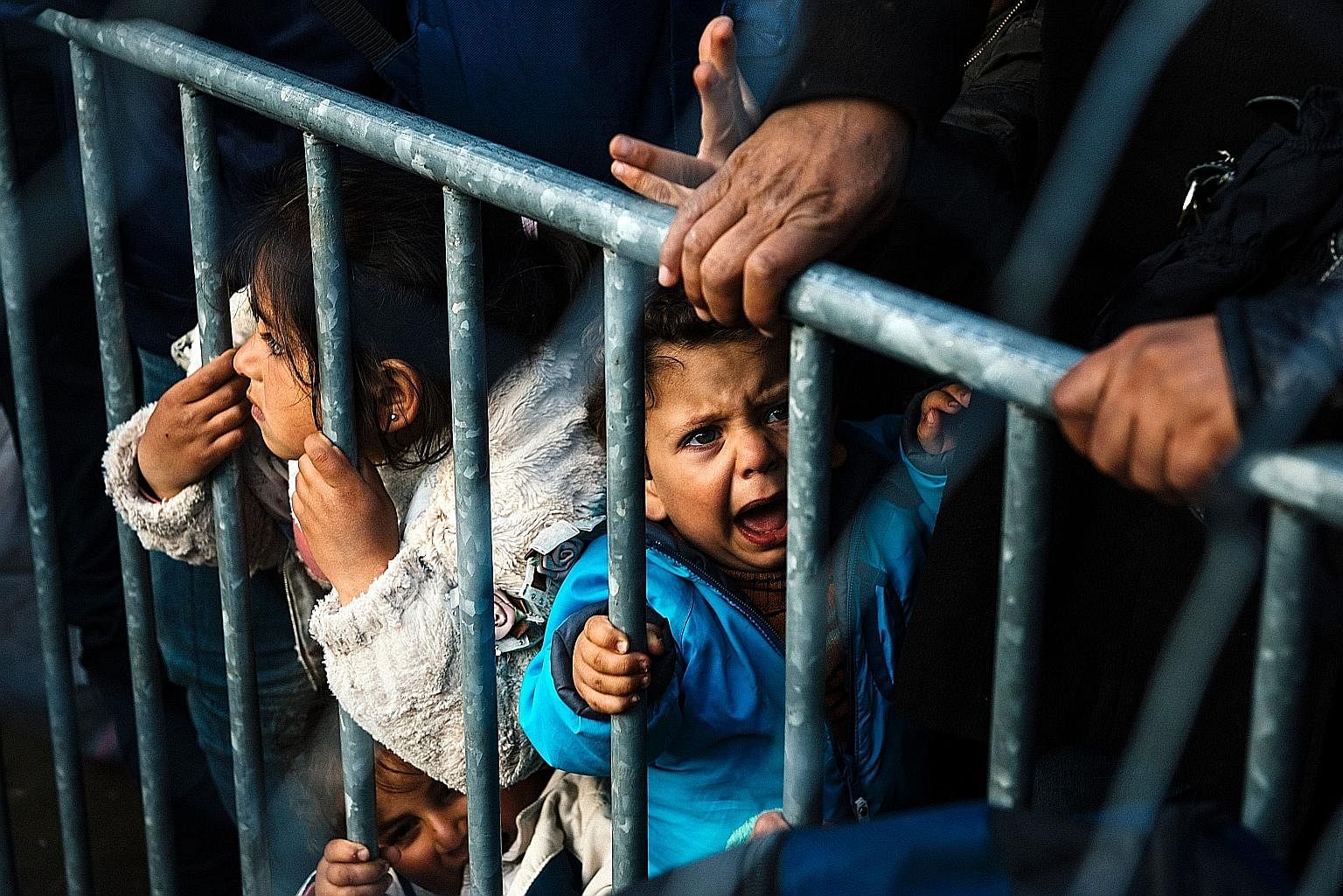European Union leaders are gathering in Brussels today for a special summit with Turkey, devoted to halting the immigration flows into the continent.
Officially, the outlines of a Turkish-European deal are already in place: In return for blocking the route through Turkey, which acts as the conduit for up to 90 per cent of asylum seekers from the Middle East and further afield, the Turks will be offered up to €3.3 billion (S$5 billion) in immediate financial aid, plus further help to deal with refugees for years to come.
But in reality, both the European Union and the Turkish government remain deeply divided over the deal. The only matter on which all summiteers agree is that Europe's migration problem is getting worse by the day. Over 130,000 asylum-seekers crossed the Turkish border with the EU in the first two months of this year, double the number during the same period last year.
As leader of the country which accepted over one million refugees during the past year alone, German Chancellor Angela Merkel has led the push for what she refers to as the Turkey Action Plan. At its core is an offer to help Turkey build new refugee camps on its soil with EU money, the bulk of which will be provided by Germany itself.
This places additional burdens on Turkey, which is already home to up to 2.2 million refugees from Syria. So, in return for a Turkish promise that it will seal its borders with Europe, the German government is suggesting that the EU should agree to take each year a set number of refugees directly from Turkish camps, and distribute them throughout the EU member-states.
Dr Merkel acknowledges that the deal is controversial with electorates throughout Europe, none of which are in the mood to accept new migrants. But she points out that the alternative is to continue with the free-for-all at Europe's frontiers, resulting in a humanitarian disaster in Greece which neighbours Turkey, and where over 30,000 refugees are already stranded, as tighter border controls are now erected throughout Europe.

The German leader, who was crucial to averting Greece's bankruptcy last year, says helping that vulnerable country cope with migrants is essential: "We didn't keep Greece in the Eurozone only to then leave it in the lurch", she told German legislators in Berlin recently.
However, this approach is rejected by a group of former communist central and eastern European states, led by Mr Viktor Orban, the vocal Prime Minister of Hungary. They accept that Turkey should be offered cash, but refuse to contemplate accepting any refugees for settlement, and shrug off accusations that this violates European solidarity principles.
"Individual action is better than unified inertia", Mr Orban told journalists in Budapest over the weekend.
Meanwhile, in neighbouring Slovakia, Prime Minister Robert Fico's party retained its lead in national elections yesterday, on a similar pledge to keep refugees out.
EU President Donald Tusk, himself a former prime minister from Poland, has devoted all his energies to forging a compromise between eastern and western European nations over Turkey.
He claims to have won a significant concession: Last week, the Turks agreed to take back 300 migrants from North African countries whose asylum applications were rejected in Europe.
"Cooperation with Turkey is already starting to bear fruit", said Mr Dimitris Avramopoulos, the top EU official for immigration.
But the snag is that Turkish politicians are themselves divided on whether to accept the deal which the Europeans are struggling to offer.
In private discussions, Turkish President Recep Tayyip Erdogan, who has the final say over foreign and security matters, has told European officials that he wants two additional concessions - an agreement to lift the current visa requirements on Turkish citizens visiting EU countries, and a promise to hasten Turkey's own application to join the Union, which has been stalled for decades.
President Erdogan has a point: If Turkey is to be expected to shoulder Europe's migration problem, it should be offered a broader partnership.
However, European governments know that an agreement to eliminate visa requirements for Turkish citizens won't be popular.
And, again, eastern European nations have other priorities: "If in future we grant visa-free entry to anyone, Ukraine must be first on the list," said Mr Orban, Hungary's premier.
It's not in anyone's interest to see today's summit fail. But it's already clear that the Turks are managing expectations, by sending their prime minister, rather than their president, to attend the talks.
And Europe seems set to remain as far as it has always been from establishing a common refugee policy.
